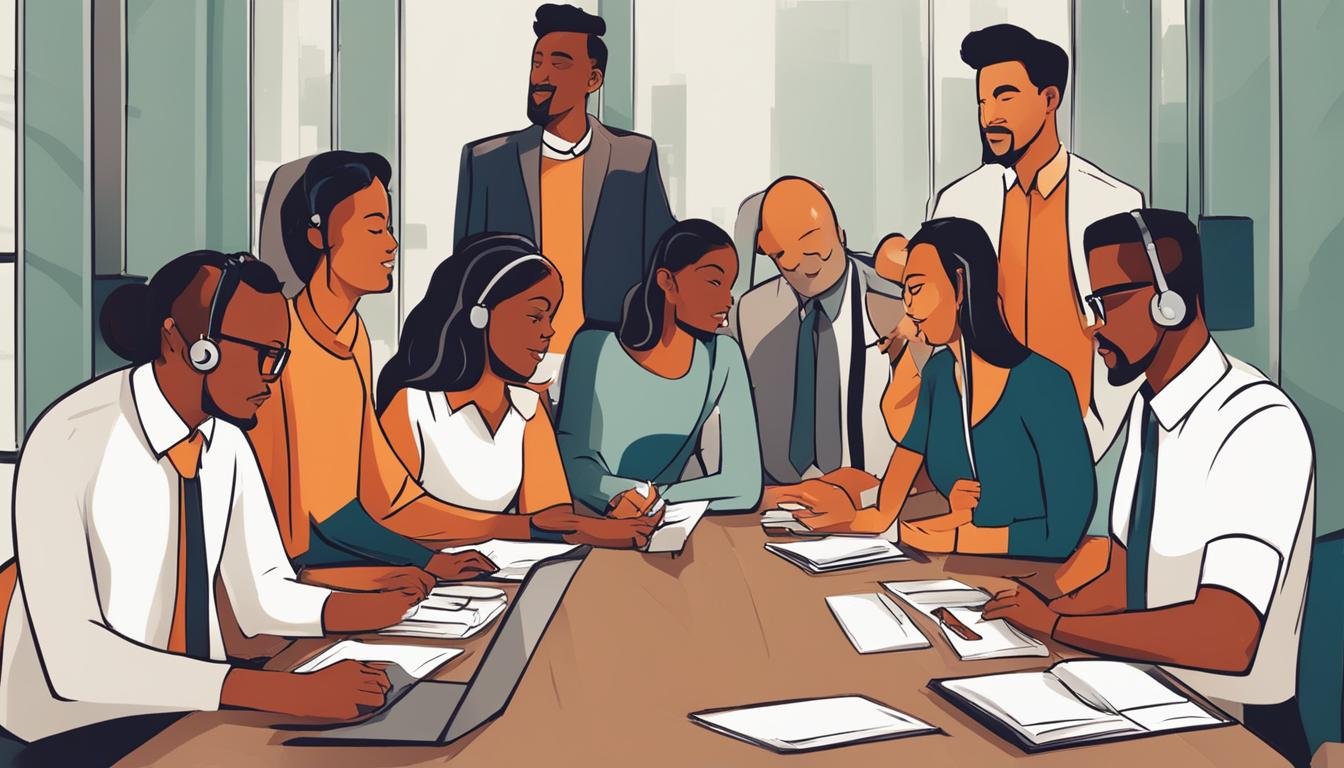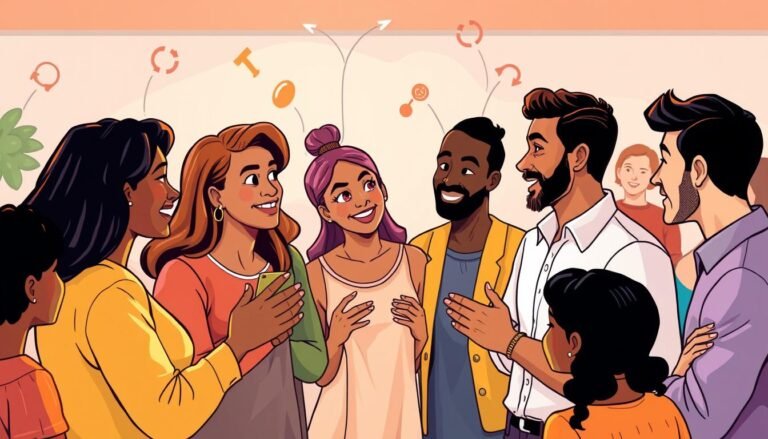Boosting Soft Skills Teamwork for Success
“Alone we can do so little; together we can do so much.” – Helen Keller
Building strong soft skills, such as effective communication and collaboration, is fundamental to the success of any team. Research shows that teams often lack the clarity assumed by their leaders, leading to inefficiencies and misunderstandings. By implementing formal procedures for decision-making and problem-solving, teams can eliminate bottlenecks and achieve their goals more efficiently. Successful teamwork requires strategic decision-making, positive behaviors, and a supportive environment.
Key Takeaways:
- Effective communication and collaboration are essential for successful teamwork.
- Active listening promotes shared understanding and minimizes misunderstandings.
- Clear goal-setting and role clarification enhance clarity and accountability.
- Standard decision-making processes and problem-solving techniques improve efficiency.
- Developing emotional intelligence and practicing conflict resolution skills foster a positive work environment.
The Importance of Effective Communication in Teamwork
Effective communication is a vital element for successful teamwork. It not only fosters collaboration but also minimizes misunderstandings and boosts productivity. When team members communicate effectively, they can share ideas, exchange information, and work towards common goals more efficiently.
Active listening is a fundamental aspect of effective communication. It involves giving full attention to the speaker, understanding their message, and responding appropriately. By actively listening, team members can develop a clear understanding of each other’s perspectives, goals, and challenges, fostering a sense of empathy and mutual respect.
“Good communication is the bridge between confusion and clarity” – Nat Turner
Implementing effective communication strategies can greatly enhance teamwork. Here are some strategies that teams can employ:
- Sending agendas before meetings: Sharing meeting agendas in advance allows team members to prepare and contribute actively during discussions.
- Checking in with each person during meetings: Taking the time to ask for input and address any concerns or questions shows that each team member’s voice is valued and encourages open communication.
- Understanding communication styles: Recognizing that team members may have different communication preferences and adjusting to accommodate these differences can contribute to more effective and meaningful interactions.
- Scheduling regular team stand-ups: Conducting brief stand-up meetings at the beginning or end of each day promotes transparency, alignment, and the sharing of important updates.
By implementing these strategies, teams can create a communication-rich environment that facilitates collaboration, improves problem-solving, and fosters a sense of unity.
| The Benefits of Effective Communication in Teamwork | Effective Communication Strategies |
|---|---|
| 1. Enhanced collaboration | Sending agendas before meetings |
| 2. Minimized misunderstandings | Checking in with each person during meetings |
| 3. Increased productivity | Understanding communication styles |
| Scheduling regular team stand-ups |
The Power of Collaboration in Teamwork
Collaboration is an essential element of successful teamwork. By working harmoniously with colleagues from different backgrounds and departments, teams can achieve their shared goals more effectively. Collaboration encourages fresh perspectives, creativity, and collective problem-solving, fostering a sense of unity and ownership within the team.
To promote collaboration in the team, it is crucial to establish clear roles and responsibilities for each team member. When everyone knows their specific tasks and areas of expertise, it becomes easier to leverage individual strengths and maximize productivity.
Creating shared documents detailing tasks and projects is another effective way to facilitate collaboration. These documents serve as a centralized source of information, ensuring that everyone stays on the same page and understands the overall project objectives.
Nurturing a Supportive Environment
Establishing team norms is vital for fostering collaboration. These norms outline the principles and expectations that guide team behavior and interactions. By setting guidelines for respectful communication, active listening, and a growth mindset, teams can create a supportive environment that encourages collaboration and mutual respect.
“Collaboration is the key to unlocking the collective genius within a team.” – Patrick Lencioni
Running working agreements further enhances collaboration by providing a framework for resolving conflicts and avoiding misunderstandings. These agreements allow team members to express their opinions openly, address issues promptly, and find solutions collaboratively.
An Example of Collaboration in Action
| Benefits of Collaboration | Example Scenario |
|---|---|
| Enhanced problem-solving | When a team is faced with a complex challenge, collaboration allows members to pool their diverse skills and knowledge, leading to innovative and effective solutions. |
| Increased creativity | Working collaboratively provides an opportunity for team members to bounce ideas off each other and build on each other’s contributions, leading to more inventive and out-of-the-box solutions. |
| Improved communication | Collaboration requires active communication and active listening, minimizing misunderstandings and ensuring that all team members are aligned and working towards a common goal. |
| Strengthened relationships | Collaboration fosters a sense of camaraderie and trust among team members, forging stronger relationships that can withstand challenges and promote a positive team culture. |
Embracing Collaboration for Team Success
By promoting collaboration within the team, organizations can unleash the full potential of their workforce. It is important to nurture an environment that values teamwork, encourages open communication, and recognizes the contributions of every team member.
Collaboration is not just about working together; it is about harnessing the collective intelligence and building upon the diverse skills and experiences of every team member. When collaboration thrives, teams can achieve remarkable results, generating innovative ideas, and fostering a sense of accomplishment and fulfillment among team members.
Setting Clear Goals in Teamwork
Clear goal-setting is crucial for successful teamwork. When leaders explain team and company goals and involve team members in the goal-setting process, it fosters a sense of ownership and commitment. By setting clear goals, teams can align their efforts, remain focused, and work towards a common purpose.
One effective method for setting goals is by using the SMART framework: Specific, Measurable, Achievable, Relevant, and Time-bound. SMART goals provide clarity and direction, aiding in tracking progress and evaluating success.
“When working in a team, it’s important to set goals that are Specific, Measurable, Achievable, Relevant, and Time-bound.”
Organizations also utilize goal-setting systems like OKRs (Objectives and Key Results) or goals, signals, and measures to enhance clarity and accountability in teamwork. OKRs help teams define objectives and measure key results, fostering a results-oriented mindset and ensuring everyone is aligned and working towards the same targets.
Storing team goals in a centralized location, such as a document or project management tool, allows for easy access and reference. This way, team members can stay updated on progress and realign efforts as necessary.
Breaking down long-term goals into smaller, manageable short-term goals is another effective strategy in teamwork. These short-term goals provide milestones and checkpoints, boosting motivation and providing a sense of accomplishment along the way.
“Setting clear goals gives teams a sense of direction and purpose, aligning everyone towards a common objective.”
Here is an example of how a team goal-setting table might look:
| Goal | Objective | Key Results |
|---|---|---|
| Increase customer satisfaction | Improve response time | Reduce average response time to customer inquiries by 20% within the next quarter |
| Enhance product quality | Reduce defects | Achieve a defect rate of less than 1% per product batch |
| Expand market reach | Increase brand awareness | Grow social media following by 20% in the next six months |
Setting clear goals provides teams with focus, direction, and a sense of purpose. It enables everyone to work together towards a common objective, increasing productivity and ultimately achieving success in teamwork.
Decision-Making in Teamwork
Decision-making is a vital skill that drives effective teamwork. It involves actively listening to diverse perspectives, carefully considering various options, and collectively reaching a consensus. By embracing standardized decision-making processes and utilizing frameworks like DACI (Driver, Approver, Contributor, Informed), teams can establish a structured approach to making informed choices.
However, decision delays can hinder progress and productivity. Setting clear deadlines for decision-making can help teams overcome analysis paralysis and prevent decision fatigue. The ability to make efficient decisions is crucial for maintaining momentum and achieving team goals.
“The strength of the team is each individual member. The strength of each member is the team.” – Phil Jackson
To illustrate the importance of efficient decision-making, consider the following example:
| Scenario | Decision-Making Approach | Outcome |
|---|---|---|
| 1. Launching a new marketing campaign | Implemented a collaborative decision-making process where each team member had a voice in selecting the campaign strategy. | Team members felt empowered and engaged in the campaign, resulting in increased creativity and a successful launch. |
| 2. Selecting a vendor for a new project | Adopted the DACI framework, clearly defining roles and responsibilities. Conducted thorough research and analysis before making a collective decision. | The chosen vendor provided high-quality services within the agreed timeline and budget, ensuring project success. |
| 3. Resolving a conflict within the team | Employed a democratic decision-making process that allowed open dialogue and consensus-building among team members. | The conflict was effectively resolved, fostering a more collaborative and harmonious team environment. |
Integrating effective decision-making practices into teamwork encourages transparency, accountability, and trust among team members. By addressing decision-related challenges and ensuring timely resolutions, teams can optimize their performance and achieve desired outcomes.
Overcoming Decision Delays
Overcoming decision delays is crucial for maintaining team momentum and achieving success. Here are some strategies to expedite the decision-making process:
- Establish clear decision-making roles: Clearly define and assign roles within the decision-making process to ensure accountability and streamline the decision-making journey.
- Set deadlines: Establish deadlines for decision-making to prevent analysis paralysis and maintain a sense of urgency.
- Encourage open communication: Foster an environment where team members feel comfortable expressing their opinions, promoting more efficient decision-making.
- Utilize technology: Leverage collaboration tools and software to facilitate virtual decision-making and ensure everyone’s input is captured.
By adopting these strategies, teams can overcome decision-making challenges and enhance their ability to collaborate effectively.
Problem-Solving in Teamwork
Problem-solving skills are essential in teamwork. They involve analyzing complex situations, identifying root causes, and finding effective solutions. When teams come together to solve problems, they can leverage their collective knowledge and expertise to create innovative solutions.
One effective problem-solving technique is problem framing. This involves clearly defining the problem and its scope, which allows the team to focus their efforts and resources on finding a solution. By understanding the problem from multiple perspectives, teams can identify the underlying issues and address them systematically.
Another valuable tool in problem-solving is the 5 Whys Analysis. This technique helps teams dig deeper into the root causes of a problem by repeatedly asking “why” until the core issue is uncovered. By going beyond the surface-level symptoms, teams can develop comprehensive solutions that address the underlying issues.
Problem-solving skills are not just about finding quick fixes; they require critical thinking, creativity, and collaboration. When teams approach problems with a growth mindset and a willingness to explore different possibilities, they can unlock innovative solutions and drive continuous improvement.
Sparring is a practice that can facilitate quick feedback exchange and improve problem-solving outcomes. It involves team members challenging each other’s assumptions and ideas in a constructive and respectful manner. Through sparring, teams can sharpen their problem-solving skills, expand their perspectives, and uncover blind spots in their thinking.
By promoting problem-solving skills within a team, organizations can foster a culture of innovation and agility. Teams that excel in problem-solving can overcome obstacles, adapt to changing circumstances, and drive positive change.
The Role of Emotional Intelligence in Teamwork
Emotional intelligence is a critical aspect of successful teamwork. It encompasses the ability to understand and manage emotions, demonstrate empathy, and cultivate positive relationships. In the context of teamwork, emotional intelligence plays a pivotal role in various ways.
One key contribution of emotional intelligence is its ability to navigate conflicts effectively. By understanding and managing emotions, team members can approach conflicts with empathy and facilitate constructive resolutions. This not only helps maintain harmonious working relationships but also encourages a positive and supportive team environment.
Moreover, emotional intelligence fosters collaboration among team members. When individuals possess the emotional intelligence necessary to understand others’ perspectives and work well with diverse personalities, they can harness the power of collective ideas and generate innovative solutions. This collaborative synergy is vital for driving creativity and achieving shared goals.
Benefits of Emotional Intelligence in Teamwork:
- Improved communication and understanding
- Enhanced collaboration and synergy
- Effective conflict resolution
- Establishment of trust and strong relationships
- Exceptional customer service delivery
Emotional intelligence is like a bridge that connects team members’ emotions, enabling them to work together harmoniously and achieve remarkable results.
Developing emotional intelligence can significantly enhance the overall effectiveness of teamwork. It enables team members to communicate more effectively, collaborate seamlessly, and resolve conflicts amicably. By honing their emotional intelligence skills, individuals contribute to a positive team dynamic and foster a supportive environment where everyone can thrive.
| Benefits of Emotional Intelligence in Teamwork | Description |
|---|---|
| Improved communication and understanding | Emotional intelligence enhances active listening and empathy, facilitating clear communication and shared understanding among team members. |
| Enhanced collaboration and synergy | By understanding and valuing diverse perspectives, emotionally intelligent individuals foster a collaborative environment that maximizes team synergy. |
| Effective conflict resolution | Emotional intelligence helps manage conflicts constructively, promoting resolutions that preserve relationships and advance team goals. |
| Establishment of trust and strong relationships | Team members with high emotional intelligence build trust by prioritizing open communication, respect, and understanding. |
| Exceptional customer service delivery | Emotionally intelligent teams excel in understanding and meeting customer needs, delivering outstanding service and building lasting client relationships. |
Effective Conflict Resolution in Teamwork
Conflict resolution plays a pivotal role in maintaining a harmonious work environment. Effective conflict resolution skills are crucial for preventing disputes from escalating and fostering a positive atmosphere for teamwork.
Managers who possess the ability to resolve conflicts contribute to a more productive work environment and strengthen team dynamics. By addressing conflicts promptly and efficiently, managers create an atmosphere where team members feel heard and valued.
Understanding and practicing effective conflict resolution techniques are essential for successful teamwork. They allow individuals to navigate disagreements, find mutually beneficial solutions, and maintain healthy working relationships. By proactively addressing conflicts, teams can prevent the negative consequences that arise from unresolved tensions.
“Conflict is inevitable in any team or workplace, but it is how conflicts are managed that determines the success or failure of the team.”
Adopting a proactive approach to conflict resolution, teams can mitigate the negative impacts of disagreements and channel conflict towards constructive outcomes. By fostering open communication, active listening, and empathy, team members can enhance their conflict resolution skills and strengthen collaborative efforts.
Below are some effective conflict resolution techniques that teams can employ:
- Encourage open communication and create a safe space for expressing concerns.
- Practice active listening to ensure a thorough understanding of all perspectives involved.
- Promote empathy by considering others’ viewpoints and emotions.
- Seek mutually beneficial solutions through compromise and collaboration.
- Mediate conflicts when necessary, providing a neutral perspective.
Benefits of Effective Conflict Resolution in Teamwork
When conflict is resolved effectively, teams experience several benefits:
- Improved Communication: Resolving conflicts opens up channels of communication, allowing for better collaboration and understanding.
- Increased Collaboration: By addressing conflicts, teams can enhance their ability to work together towards common goals.
- Enhanced Creativity: Conflict can lead to creative problem-solving and innovative solutions when effectively managed.
- Stronger Relationships: Successful conflict resolution builds trust and strengthens relationships among team members.
- Higher Productivity: A positive work environment resulting from effective conflict resolution leads to increased productivity and job satisfaction.
By prioritizing conflict resolution and nurturing a culture of open communication and understanding, teams can harness the potential of conflicts to drive personal growth, foster innovation, and achieve collective success.
The Role of Creativity in Teamwork
In today’s fast-paced and rapidly evolving business landscape, creativity has become a crucial soft skill that drives innovation, process enhancement, and product development in teamwork. It is the cornerstone of problem-solving and fosters a culture of continuous improvement.
Teams comprising individuals with creative mindsets have the ability to set their company apart from competitors and propel growth. By encouraging and prioritizing creativity, organizations create an environment that values and rewards unique ideas, ultimately boosting collaboration and enhancing teamwork.
When creativity is nurtured and celebrated within a team, it leads to:
- Out-of-the-box thinking
- Innovative solutions
- Improved problem-solving
- Increased adaptability
- Enhanced employee engagement
By allowing team members to express their creativity, organizations open doors to new perspectives, fresh approaches, and groundbreaking ideas. This not only benefits the team’s performance but also contributes to the overall success of the company.
The Benefits of Creativity in Teamwork
Creativity in teamwork brings numerous advantages, including:
“Creativity is contagious. Pass it on.” – Albert Einstein
| Benefits | Description |
|---|---|
| Enhanced Problem-Solving | Creative individuals bring fresh perspectives, enabling teams to identify and solve complex problems efficiently. |
| Innovation and Process Enhancement | Creativity fuels innovation, leading to the development of new products, services, and more efficient processes. |
| Adaptability | Teams with creative members can quickly adapt to changing circumstances and find innovative solutions when faced with challenges. |
| Culture of Continuous Improvement | Creativity fosters a culture of learning and encourages teams to consistently seek better ways of doing things. |
Encouraging Creativity in Teamwork
To harness the power of creativity and maximize its impact on teamwork, organizations can implement the following strategies:
- Set aside dedicated time for brainstorming sessions and idea generation.
- Create a supportive and inclusive environment where all team members feel comfortable expressing their ideas.
- Encourage collaboration and cross-pollination of ideas between team members.
- Recognize and reward creative contributions to motivate team members to think outside the box.
- Provide access to resources and tools that stimulate creativity, such as workshops, training programs, and innovation spaces.
By incorporating creativity as a core value and actively promoting it within a team, organizations can fuel collaboration, drive innovation, and unlock the full potential of their workforce.
Networking and Relationship Building in Teamwork
Building professional relationships is crucial for success in teamwork. Effective networking helps professionals enhance their professional standing, access opportunities, and gain valuable insights and support. Strong relationships foster trust and enable collaboration. The soft skills of networking and relationship building are essential in developing a strong network and thriving in teamwork.
Networking involves establishing connections and maintaining relationships with colleagues, industry peers, and potential mentors or sponsors. It provides a platform to exchange knowledge, share ideas, and explore collaborative opportunities. By actively engaging in networking activities such as attending conferences, industry events, and online forums, individuals can expand their professional network and create a diverse support system.
Nurturing Relationships
Relationship building is the process of cultivating and strengthening connections with others. It involves investing time and effort to build rapport, trust, and mutual respect. Developing strong relationships within a team fosters open communication, encourages collaboration, and improves overall team dynamics.
To build successful relationships within a team, individuals can:
- Communicate openly and attentively: Actively listen to team members, provide constructive feedback, and express ideas and opinions clearly.
- Show appreciation: Recognize the contributions of team members and express gratitude for their efforts.
- Be supportive: Offer assistance, encouragement, and resources to colleagues when needed.
- Collaborate effectively: Foster a collaborative environment where everyone feels comfortable sharing ideas and working together towards common goals.
- Resolve conflicts positively: Approach conflicts with a problem-solving mindset, promoting open dialogue and seeking mutually agreeable solutions.
Benefits of Networking and Relationship Building
Networking and relationship building in teamwork offer numerous benefits, including:
| Benefits | Description |
|---|---|
| Enhanced collaboration | Building strong relationships promotes effective collaboration and knowledge sharing within a team. |
| Access to resources and opportunities | Through networking, professionals can gain access to valuable resources, information, and career opportunities. |
| Broader perspectives | Networking exposes individuals to diverse perspectives, enabling them to gain new insights and fresh ideas. |
| Career development | Building relationships with mentors and industry professionals can provide guidance and support for professional growth. |
| Trust and support | Establishing strong relationships fosters trust, encourages support, and ensures a positive work environment. |
Networking and relationship building should be an ongoing process that individuals prioritize throughout their careers. By actively engaging in networking activities, nurturing relationships, and leveraging these connections effectively, professionals can enhance their teamwork skills and further their success in their chosen fields.
Negotiation Skills in Teamwork
Negotiation skills are a critical asset in the world of teamwork, allowing individuals to find common ground, establish mutually beneficial agreements, and effectively resolve conflicts. These skills hold immense value across various industries, as they enable teams to navigate complex situations and achieve positive outcomes. Successful negotiation is rooted in thorough preparation, empathy, and clear communication.
Preparing for Negotiations
Before engaging in a negotiation, it is crucial for team members to thoroughly prepare themselves. This involves conducting research on the topic at hand, understanding the goals and objectives of all parties involved, and anticipating potential challenges or objections. By equipping themselves with solid knowledge and a clear understanding of their own priorities, individuals can enter negotiations with confidence and a strategic advantage.
Understanding the Other Party’s Perspective
Effective negotiation relies on understanding the needs, interests, and perspectives of the other party. By practicing empathy, actively listening, and seeking to understand their motivations, team members can foster an environment of collaboration and find creative solutions that address the concerns of all stakeholders. Collaborative negotiation, rather than adversarial approaches, can lead to stronger relationships and better overall outcomes.
Clear Communication
Clear and concise communication is a fundamental aspect of successful negotiation. Team members must express their intentions, goals, and expectations with clarity, using active listening skills to ensure that they understand the other party’s viewpoint as well. Open and honest communication allows for the identification of common ground and the exploration of win-win solutions that benefit all involved.
Quoting industry expert Elizabeth Sullivan, Certified Negotiation Expert:
Effective negotiation in teamwork requires a balance of assertiveness and empathy. By approaching negotiations as a problem-solving exercise rather than a battleground, teams can foster collaboration and reach agreements that satisfy all parties involved.
The Benefits of Negotiation Skills in Teamwork
When team members possess strong negotiation skills, it positively impacts the overall dynamics and outcomes of collaborative efforts. Some key advantages include:
- Resolving conflicts: Negotiation skills allow teams to work through conflicts and find resolutions that satisfy all parties, fostering a harmonious work environment.
- Enhancing decision-making: Effective negotiation encourages open discussions and shared decision-making, leading to well-informed choices and stronger team alignment.
- Building trust and collaboration: By engaging in constructive negotiations, team members build trust, strengthen relationships, and foster a culture of collaboration.
- Driving innovation: Negotiation skills promote creativity and innovation by encouraging diverse perspectives and the exploration of different ideas and approaches.
Key Components of Effective Negotiation Skills
| Component | Description |
|---|---|
| Preparation | Thoroughly researching the subject matter, understanding goals, and anticipating challenges before engaging in negotiations. |
| Empathy | Understanding the perspectives, needs, and motivations of the other party to find common ground and foster collaboration. |
| Clear Communication | Expressing intentions, goals, and expectations clearly, actively listening to the other party, and fostering open dialogue. |
| Collaborative Problem-Solving | Approaching negotiations as a problem-solving exercise rather than a battleground, seeking win-win solutions. |
By developing strong negotiation skills within a team, members can navigate challenges, resolve conflicts, and achieve successful outcomes that drive growth and success.
Conclusion
Soft skills are essential for successful teamwork. In today’s dynamic and competitive professional landscape, developing and honing skills like effective communication, collaboration, adaptation, problem-solving, leadership, and emotional intelligence contribute to a positive work environment and career advancement.
By investing in the development of soft skills, teams can enhance their communication, productivity, and overall success. Effective communication promotes collaboration, minimizes misunderstandings, and enhances productivity, while collaboration involves working harmoniously with diverse colleagues to achieve shared goals. Setting clear goals provides clarity and accountability, and decision-making and problem-solving skills help teams overcome challenges and find effective solutions.
Additionally, emotional intelligence plays a crucial role in teamwork, fostering empathy, conflict resolution, and positive relationships. The ability to negotiate effectively allows individuals to reach mutually beneficial agreements and resolve conflicts. Prioritizing creativity and networking skills enables teams to drive innovation and build strong professional relationships.
In conclusion, soft skills are the foundation of successful teamwork. By developing and nurturing these skills, individuals and teams can create a supportive and productive work environment, leading to career growth and achieving exceptional results.








